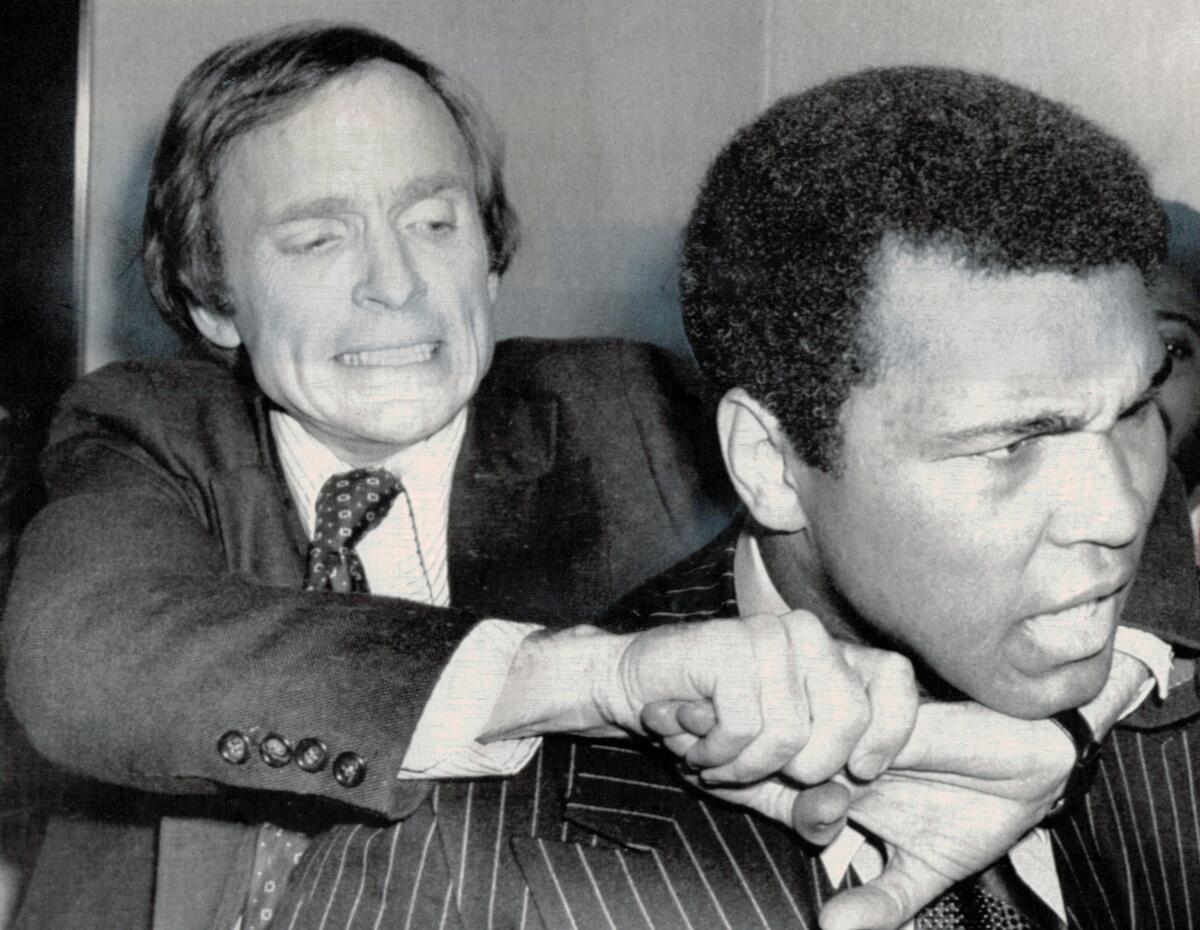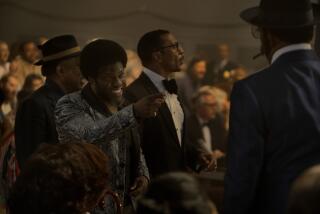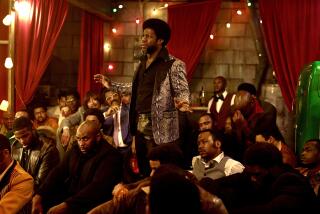Playful. Proud. Provocative. Meet Muhammad Ali, late-night sensation
Talk show host Dick Cavett can still picture the day in 1963 when he first met legendary heavyweight boxer Muhammad Ali, then still known as Cassius Clay. The future champion was drawing a crowd outside the El Capitan Theatre on Hollywood Boulevard.
“It was like seeing a god,” Cavett, 83, recalled in a recent interview. “People were just standing there in awe, just stricken by his presence, and it was really a wonderful thing to see and feel. He had what you call ‘it.’”
For the record:
3:43 p.m. Feb. 16, 2020A previous version of this article implied that Muhammad Ali, then known as Cassius Clay, was champion in 1963. He became champion in 1964.
Once inside the theater, Ali appeared on “The Jerry Lewis Show,” an ABC variety show where Cavett worked as a writer and provided the fighter with a poem to perform. It was the beginning of a long and mutually beneficial relationship between the two men depicted in the documentary “Ali & Cavett: The Tale of the Tapes,” which premieres Tuesday at 9 p.m. on HBO and streaming platforms HBO Now and HBO Go.
For longtime fight fans, the story will be familiar: It depicts the charismatic Ali’s rise from Olympic stardom to dominant heavyweight fighter and major player in the national discourse over the Vietnam War and racial inequality during the 1960s. The film recounts Ali’s affiliation with the Nation of Islam, his refusal to be inducted into the military — for which he was stripped of his title — and his comeback in the 1970s, in which his epic ring battles and engaging personality made him a global superstar.
When Cavett became a late-night host on ABC, his program was a regular forum for Ali. The clips of their many interviews — ranging from serious discussions of race relations in the U.S. to playful confrontations aimed at promoting fights — serve as connective tissue in a fresh look at Ali’s career.
Ali was a fixture on the TV talk show circuit in the precable days of the 1960s and ’70s, when most households received only ABC, CBS and NBC. His smooth face was recognizable to every man, women and child in the country.
“Ali & Cavett,” directed by Robert Bader, makes the case that Cavett’s late-night show — which began on ABC in 1969 — provided a comfort zone for Ali, especially before he became a beloved figure. Ali polarized the public with his decision to resist the draft and serve as a spokesman for the Nation of Islam, which was known for promoting racial separatism.
The connection with Cavett, a Yale-educated Midwesterner, was an intriguing one. Known for being the urbane alternative to the late-night king of the era, Johnny Carson, Cavett seemed most at home exchanging witticisms with famous guests such as Katharine Hepburn or Alfred Hitchcock. He also knew little about boxing.
“My interest in it spans the Billy Conn-Joe Louis fight up to the marriage of Ethel Merman and Ernest Borgnine,” Cavett once quipped before introducing Ali on his program.
In “Ali & Cavett,” the Rev. Al Sharpton describes Cavett as “the whitest of white guys in America.” But he remembers his show as a forum for black guests outside of the mainstream, including Ali after he was stripped of his heavyweight title.
“He would say things to Cavett about whites that you’d hear on the street corners of Harlem,” Sharpton says of Ali. “They seemed to go to the edge of the racial debate of the country.” Topical discussions on the program with critics of the Vietnam War also earned Cavett a spot on the Nixon White House’s enemies list.

Bader believes Ali appreciated how Cavett gave him a fair shake and kept coming back on the program as a result. “I think he had respect for him as an interviewer as if he was a formidable opponent,” he said. “Cavett was not going to lay down, but he was not going to be unfair.”
Over time, the duo’s exchanges became more familiar and funny. Cavett once reacted to Ali’s preening by saying, “You really get a kick out of yourself — shaving must practically be an orgasm for you.”
History can thank Cavett and his managers at the time, Jack Rollins and Charles Joffe, for preserving the conversations that tell the story in “Ali & Cavett.”
Cavett was hired by ABC in 1968 to host an hourlong daytime talk show before moving to a late-night slot. At some point, he learned that the videotapes of his programs were being erased at the end of each week for reuse — the reason why the film does not include Ali’s first appearance on his program.
Joffe and Rollins got a deal for Cavett that gave him ownership of the program and allowed him to keep the tapes, but it wasn’t cheap. “The show went off the air and when he didn’t renew his contract, they made him pay for all the blank tapes he used,” Bader said. “They wanted some ungodly sum of money. He had to pick about 400 shows to preserve and ABC erased the rest of the tapes.”
While Cavett never seriously challenged the ratings supremacy of NBC’s “The Tonight Show Starring Johnny Carson,” he had a loyal following among viewers looking for smart conversation on television. In the pre-social media era, viewers deluged ABC with letters whenever there were reports of a possible cancellation. ABC’s affiliates were protective of Cavett as well, eager to have an intelligent program to point to at a time when there was not much else available on that front.
Cavett parted ways with the network in 1974 but the reputation he built during that period kept him in demand for years. He had nightly half-hour talk shows on PBS from 1977 to 1982, USA Network from 1985 to 1986 and CNBC, during the cable network’s early years, from 1989 to 1996. He owns them all.
Bader oversees the archive of 2,000 hours, which provides a treasure trove of conversations with personalities from the arts, politics, sports, literature and show business who sat with Cavett over his long career. He has already culled them for DVD sets and specials for Turner Classic Movies and PBS. Cavett’s shows also are presented nightly on the classic TV network Decades.
Bader is at work on more documentaries using Cavett’s archive, which is getting a permanent home in the Library of Congress. There may eventually be one about the host himself.
Meanwhile, “Ali & Cavett” offers a slice of living history from a turbulent time, and a chance for Cavett to reflect on what he believes was a real friendship.
Ali once thanked the host for having him on as a guest after losing a fight. He is seen with a wired jaw after a defeat to Ken Norton in 1973. Cavett acknowledges that for years he dined out on how Ali called him “his main man” on that program.
“I tried to be modest about that, but I couldn’t,” he said. “It’s an emotional kick. Whenever I saw him, I felt better.”
More to Read
The complete guide to home viewing
Get Screen Gab for everything about the TV shows and streaming movies everyone’s talking about.
You may occasionally receive promotional content from the Los Angeles Times.







